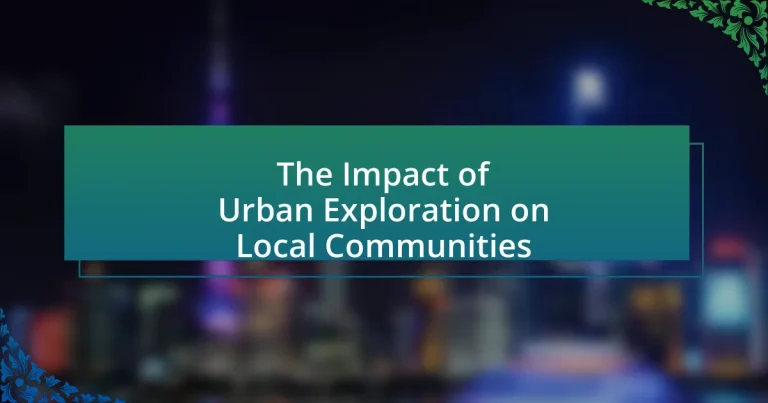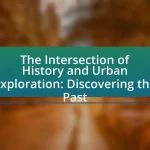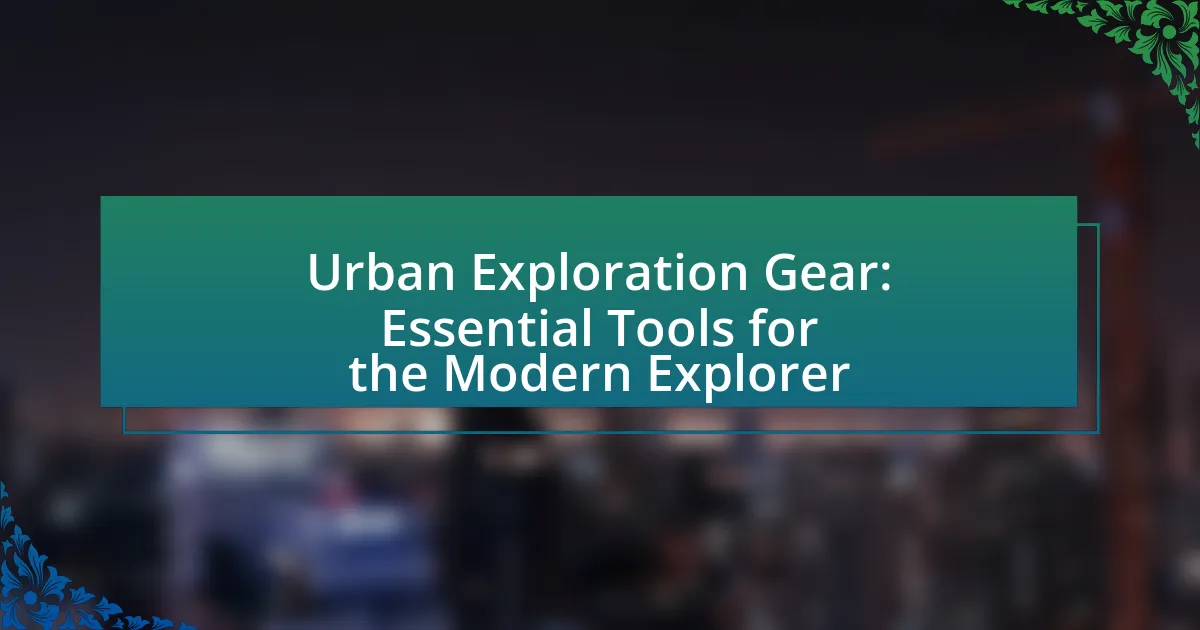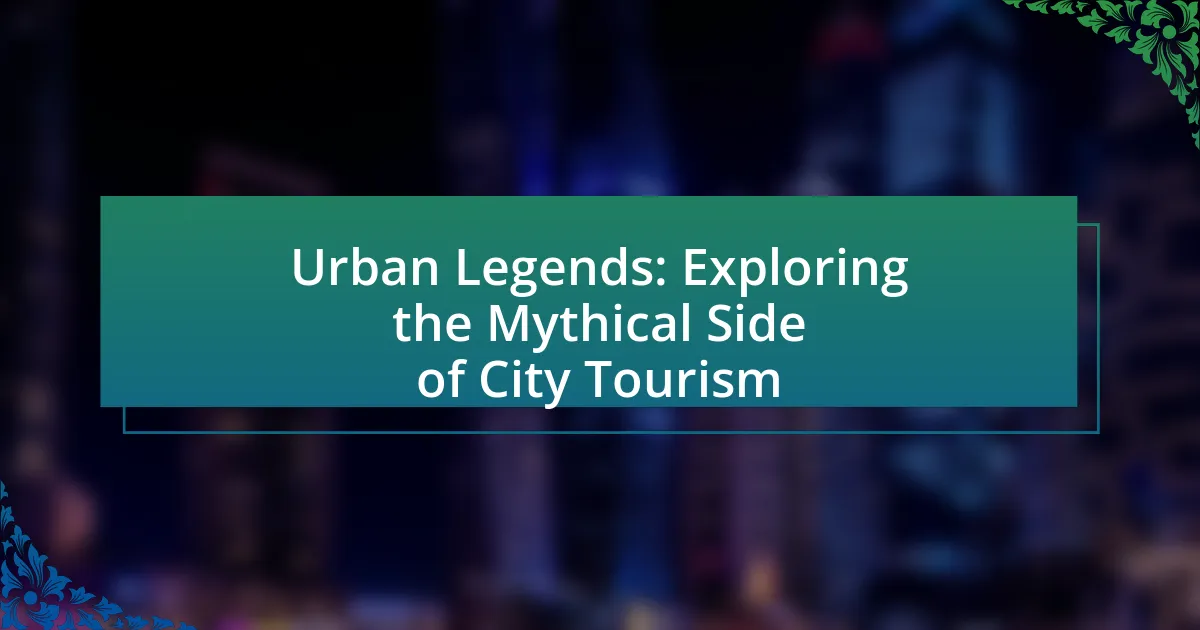Urban exploration significantly impacts local communities by enhancing awareness and appreciation of historical and abandoned sites, which can lead to increased tourism and economic benefits. This activity fosters community engagement and pride, as residents often become more invested in preserving their local heritage. However, urban exploration also presents challenges, including safety hazards, property damage, and potential conflicts with local authorities. The article examines the social implications, economic effects, and best practices for urban explorers, emphasizing the need for respectful interactions between explorers and communities to mitigate negative impacts while promoting cultural preservation and community cohesion.
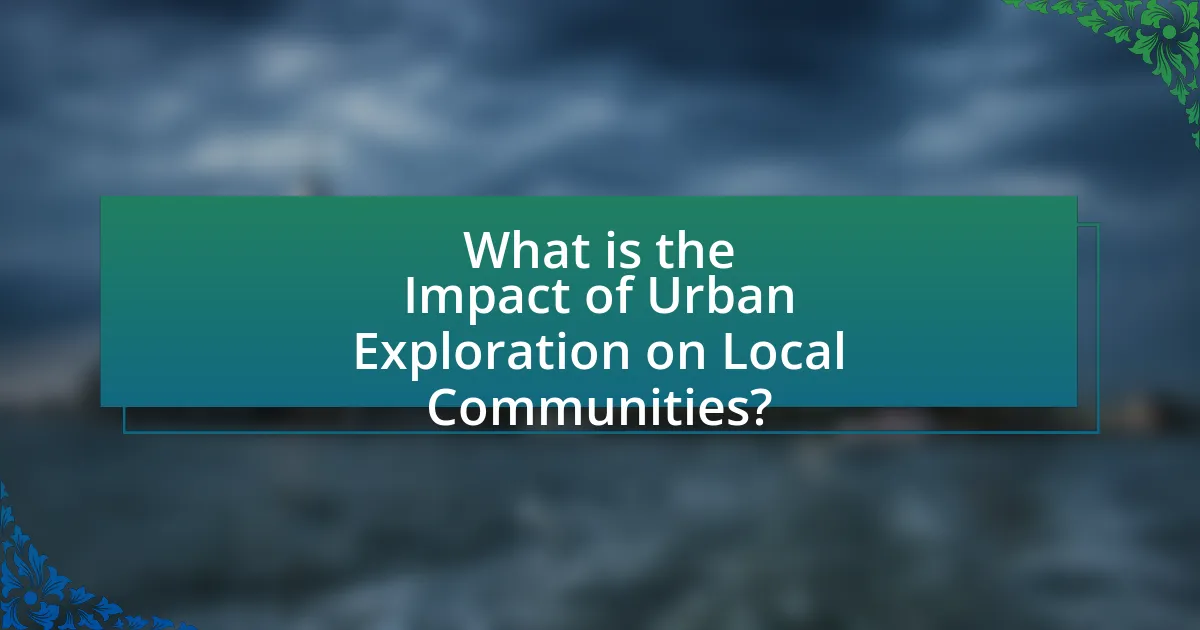
What is the Impact of Urban Exploration on Local Communities?
Urban exploration can significantly impact local communities by fostering awareness and appreciation of historical and abandoned sites. This activity often leads to increased tourism, which can boost local economies as explorers spend money on nearby businesses. For instance, a study by the University of Southern California found that urban exploration can enhance community engagement and pride, as residents become more invested in preserving their local heritage. Additionally, urban exploration can sometimes lead to conflicts with property owners and local authorities, as trespassing may occur, highlighting the need for dialogue between explorers and communities to establish respectful practices.
How does urban exploration influence community dynamics?
Urban exploration influences community dynamics by fostering a sense of shared identity and engagement among participants. This activity encourages individuals to connect with their local environment, often leading to increased awareness of historical and cultural significance within urban spaces. Research indicates that urban explorers frequently form communities that advocate for the preservation of neglected sites, thereby promoting local heritage and community pride. For instance, studies have shown that urban exploration can lead to revitalization efforts in areas that explorers highlight, ultimately benefiting local economies and social cohesion.
What are the social implications of urban exploration in neighborhoods?
Urban exploration in neighborhoods can lead to both positive and negative social implications. On one hand, it fosters community engagement and awareness by encouraging individuals to appreciate local history and architecture, as evidenced by groups that organize urban exploration activities to highlight cultural heritage. On the other hand, it can result in tensions between explorers and residents, particularly when explorations involve trespassing or vandalism, which can disrupt community cohesion and lead to safety concerns. Studies have shown that urban exploration can sometimes provoke gentrification, as increased interest in neglected areas may attract developers, altering the social fabric of the neighborhood.
How does urban exploration affect local businesses and economies?
Urban exploration can positively and negatively affect local businesses and economies. On one hand, urban explorers often contribute to local economies by increasing foot traffic in areas that may be overlooked, leading to higher sales for nearby businesses. For instance, a study by the Urban Land Institute found that increased tourism from urban exploration can boost local retail and hospitality sectors by up to 20%. Conversely, urban exploration can also lead to vandalism or trespassing, which may deter investment and harm the reputation of neighborhoods, ultimately affecting local businesses negatively. Therefore, the impact of urban exploration on local economies is multifaceted, with both beneficial and detrimental effects.
What are the potential benefits of urban exploration for communities?
Urban exploration can significantly benefit communities by fostering social cohesion and promoting cultural awareness. Engaging in urban exploration encourages residents to discover and appreciate their local history, architecture, and hidden spaces, which can lead to a stronger sense of identity and belonging. For instance, studies have shown that communities with active exploration groups often report increased neighborhood pride and participation in local events. Additionally, urban exploration can stimulate economic activity by attracting tourism and encouraging local businesses to cater to explorers, thereby enhancing community development.
How can urban exploration promote community engagement and awareness?
Urban exploration can promote community engagement and awareness by fostering a sense of shared history and cultural appreciation among residents. Through exploring abandoned or lesser-known urban spaces, individuals often discover local stories, architectural heritage, and community narratives that may otherwise remain overlooked. This engagement can lead to organized events, such as guided tours or community clean-up initiatives, which encourage collaboration and dialogue among residents. Research indicates that such activities can enhance social cohesion and increase civic pride, as seen in various urban revitalization projects where community members actively participate in preserving their local environment.
What role does urban exploration play in cultural preservation?
Urban exploration plays a significant role in cultural preservation by documenting and raising awareness of abandoned or neglected sites that hold historical and cultural value. Through photography, storytelling, and social media sharing, urban explorers highlight the importance of these locations, often prompting community interest and advocacy for their preservation. For instance, the exploration of industrial ruins can reveal insights into a city’s economic history and architectural heritage, leading to initiatives aimed at restoring or repurposing these sites for future generations. This engagement not only fosters a sense of local identity but also encourages dialogue about the significance of preserving cultural landmarks in the face of urban development.
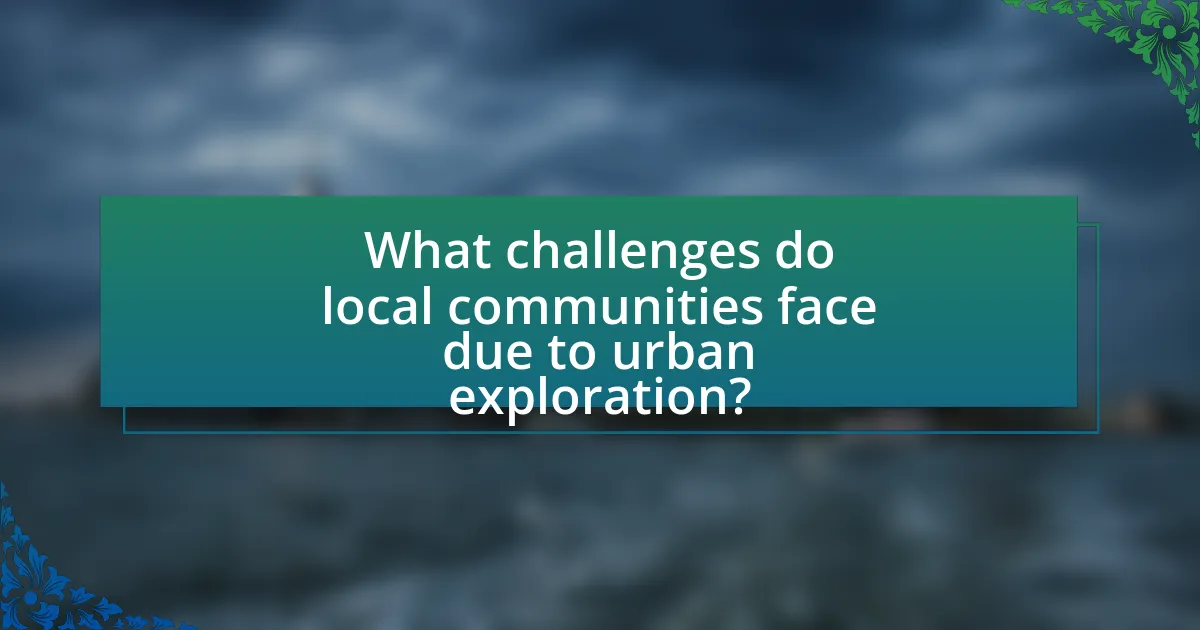
What challenges do local communities face due to urban exploration?
Local communities face several challenges due to urban exploration, including safety hazards, property damage, and increased crime rates. Safety hazards arise when explorers enter abandoned or unsafe structures, posing risks not only to themselves but also to local residents who may be affected by accidents or emergencies. Property damage occurs when explorers vandalize or trespass on private properties, leading to financial burdens for property owners and potential legal disputes. Additionally, urban exploration can lead to increased crime rates, as the presence of explorers may attract vandalism, theft, or other illicit activities, thereby compromising community safety and security. These challenges highlight the complex relationship between urban exploration and local community well-being.
How does urban exploration lead to safety and security concerns?
Urban exploration leads to safety and security concerns primarily due to the inherent risks associated with accessing abandoned or restricted sites. These locations often contain hazardous materials, unstable structures, and potential criminal activity, which can pose significant dangers to explorers. For instance, a study by the National Institute for Occupational Safety and Health highlights that individuals entering such environments face risks of injury from falls, exposure to toxic substances, and encounters with law enforcement due to trespassing. Additionally, urban exploration can strain local emergency services, as they may need to respond to accidents or incidents involving explorers in unsafe areas, further emphasizing the safety and security implications for communities.
What risks do explorers pose to themselves and the community?
Explorers pose significant risks to themselves and the community, primarily through potential physical harm and legal consequences. For instance, urban explorers often navigate hazardous environments, such as abandoned buildings or industrial sites, which can lead to injuries from falls, exposure to toxic substances, or encounters with dangerous wildlife. According to a study published in the Journal of Urban Exploration, over 30% of urban explorers reported sustaining injuries during their activities, highlighting the physical dangers involved.
Additionally, explorers can disrupt local communities by trespassing on private property, leading to legal repercussions for both the explorers and property owners. This can strain community relations and result in increased law enforcement presence in areas frequented by explorers. A report from the National Association of Property Owners indicated that trespassing incidents have risen by 25% in urban areas known for exploration activities, illustrating the legal and social impact on communities.
How can communities mitigate the negative impacts of urban exploration?
Communities can mitigate the negative impacts of urban exploration by implementing regulations and promoting responsible exploration practices. Establishing clear guidelines for urban explorers can help reduce vandalism and trespassing incidents, as seen in cities like Detroit, where local authorities have created designated exploration zones. Additionally, engaging local residents in awareness campaigns can foster respect for shared spaces, leading to a decrease in littering and property damage. Research indicates that communities with active involvement in urban exploration initiatives report fewer negative outcomes, highlighting the effectiveness of collaborative efforts in managing urban exploration responsibly.
What legal issues arise from urban exploration activities?
Urban exploration activities often lead to legal issues such as trespassing, property damage, and liability concerns. Trespassing occurs when individuals enter private or restricted properties without permission, which can result in criminal charges or civil lawsuits. Property damage may arise if explorers inadvertently or intentionally alter the site, leading to financial liability for repairs. Additionally, liability concerns emerge if an explorer is injured on the property, as property owners may face lawsuits for unsafe conditions. These legal ramifications highlight the risks associated with urban exploration and its potential impact on local communities.
What are the laws governing trespassing and property rights?
Laws governing trespassing and property rights vary by jurisdiction but generally establish that entering someone’s property without permission constitutes trespassing. Trespassing laws protect property owners’ rights to control access to their land, and violations can lead to civil liability or criminal charges. For instance, in the United States, the Restatement (Second) of Torts outlines that a property owner has the right to exclude others from their property, and unauthorized entry can result in damages awarded to the property owner. Additionally, property rights are often enshrined in local statutes and common law, which define the boundaries of lawful entry and the consequences of trespassing.
How do local governments respond to urban exploration incidents?
Local governments typically respond to urban exploration incidents by enforcing trespassing laws and increasing security measures in abandoned or restricted areas. This response is aimed at ensuring public safety and preventing potential hazards associated with urban exploration, such as injuries or property damage. For instance, municipalities may install fencing, signage, or surveillance systems to deter unauthorized access. Additionally, local authorities often collaborate with law enforcement to monitor known exploration sites and may issue fines or warnings to individuals caught trespassing. These actions reflect a proactive approach to managing the risks associated with urban exploration while balancing community interests and safety concerns.
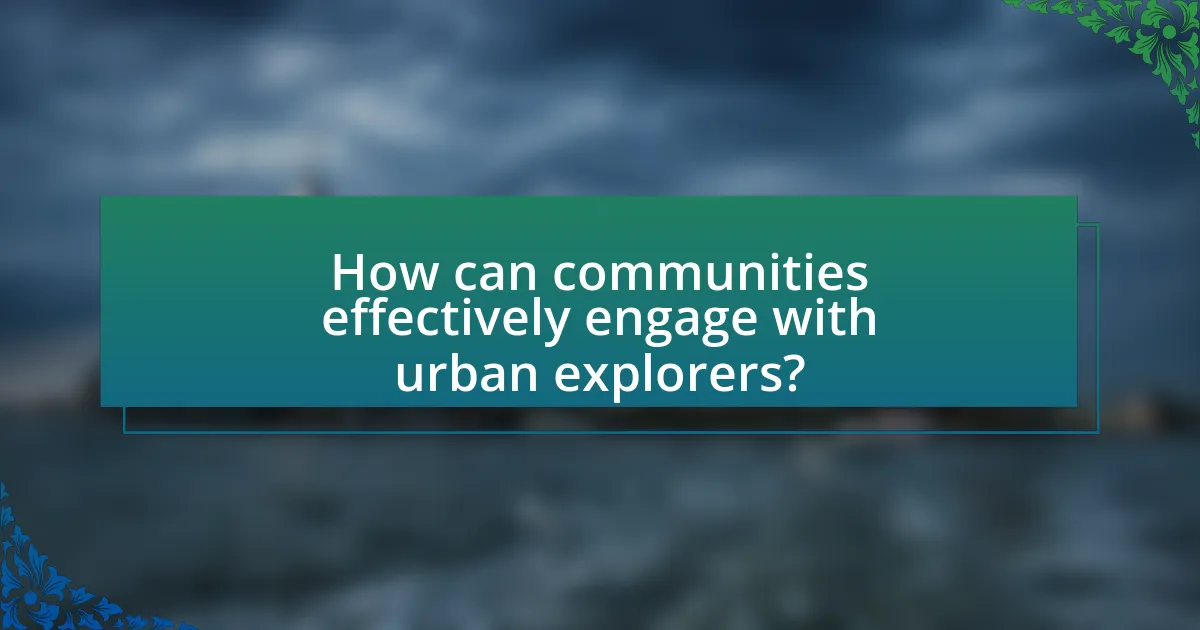
How can communities effectively engage with urban explorers?
Communities can effectively engage with urban explorers by creating structured programs that promote safe exploration and collaboration. These programs can include guided tours, workshops, and events that educate both explorers and residents about the historical and cultural significance of urban spaces. For instance, cities like Detroit have successfully implemented urban exploration initiatives that involve local historians and community leaders, fostering a sense of shared ownership and responsibility. This engagement not only enhances community awareness but also encourages urban explorers to contribute positively, such as through cleanup efforts or local advocacy, thereby strengthening community ties and preserving local heritage.
What strategies can local communities adopt to collaborate with urban explorers?
Local communities can adopt strategies such as organizing guided tours, creating partnerships with urban explorers, and establishing community events to collaborate effectively. By organizing guided tours, communities can showcase local history and culture while ensuring that urban explorers engage respectfully with the environment. Partnerships with urban explorers can facilitate knowledge exchange, where explorers share insights about urban spaces, and communities can provide context and support for exploration activities. Additionally, hosting community events that invite urban explorers to participate fosters a sense of inclusion and encourages responsible exploration, ultimately benefiting both parties. These strategies enhance community engagement and promote sustainable urban exploration practices.
How can community events be organized to include urban exploration?
Community events can be organized to include urban exploration by integrating guided tours, workshops, and collaborative projects that highlight local history and architecture. Organizers can collaborate with urban exploration groups to design routes that showcase hidden gems and lesser-known sites, ensuring participants engage with the urban environment in a meaningful way. For instance, cities like Detroit have successfully hosted urban exploration events that attract both locals and tourists, fostering community pride and awareness of local heritage. These events can also include educational components, such as talks from historians or urban planners, to deepen participants’ understanding of the area’s significance.
What educational programs can be developed to inform explorers about local history?
Educational programs that can be developed to inform explorers about local history include guided tours, workshops, and interactive digital platforms. Guided tours can provide firsthand experiences of historical sites, led by knowledgeable local historians who can share specific narratives and facts about the area’s past. Workshops can focus on topics such as local architecture, significant events, or cultural heritage, allowing participants to engage deeply with the material. Interactive digital platforms, such as mobile apps or websites, can offer virtual tours and educational resources, making local history accessible to a broader audience. These programs can be supported by historical data, such as census records or archival photographs, to enhance the learning experience and provide concrete evidence of the local community’s evolution over time.
What best practices should urban explorers follow to minimize their impact?
Urban explorers should follow best practices such as respecting property boundaries, minimizing noise, and leaving no trace to minimize their impact. Respecting property boundaries prevents trespassing and potential legal issues, while minimizing noise helps maintain the peace in surrounding areas. Leaving no trace ensures that the environment remains undisturbed, preserving it for future explorers and local communities. These practices align with the principles of responsible exploration, which emphasize the importance of being considerate and environmentally conscious.
How can explorers respect local communities and their spaces?
Explorers can respect local communities and their spaces by engaging in responsible practices that prioritize cultural sensitivity and environmental stewardship. This includes obtaining permission before entering private or sacred areas, adhering to local customs and traditions, and minimizing their ecological footprint by avoiding littering and damaging natural habitats. Research indicates that respectful interactions foster positive relationships between explorers and communities, enhancing mutual understanding and cooperation. For instance, studies show that when explorers participate in community-led initiatives, they contribute to local economies and promote sustainable tourism, which benefits both parties.
What guidelines should be established for responsible urban exploration?
Responsible urban exploration should adhere to guidelines that prioritize safety, legality, and respect for communities. Explorers must always seek permission before entering private properties, as trespassing can lead to legal consequences and disrupt local residents. Additionally, maintaining safety by wearing appropriate gear and traveling in groups minimizes risks associated with exploring abandoned or hazardous sites.
Respecting the environment is crucial; explorers should avoid vandalism and littering, as these actions can harm local ecosystems and community aesthetics. Engaging with local communities positively, such as participating in clean-up efforts or sharing findings respectfully, fosters goodwill and mitigates negative impacts.
These guidelines are supported by the principles of responsible tourism, which emphasize the importance of minimizing harm to local cultures and environments while enhancing the experience for both visitors and residents.
